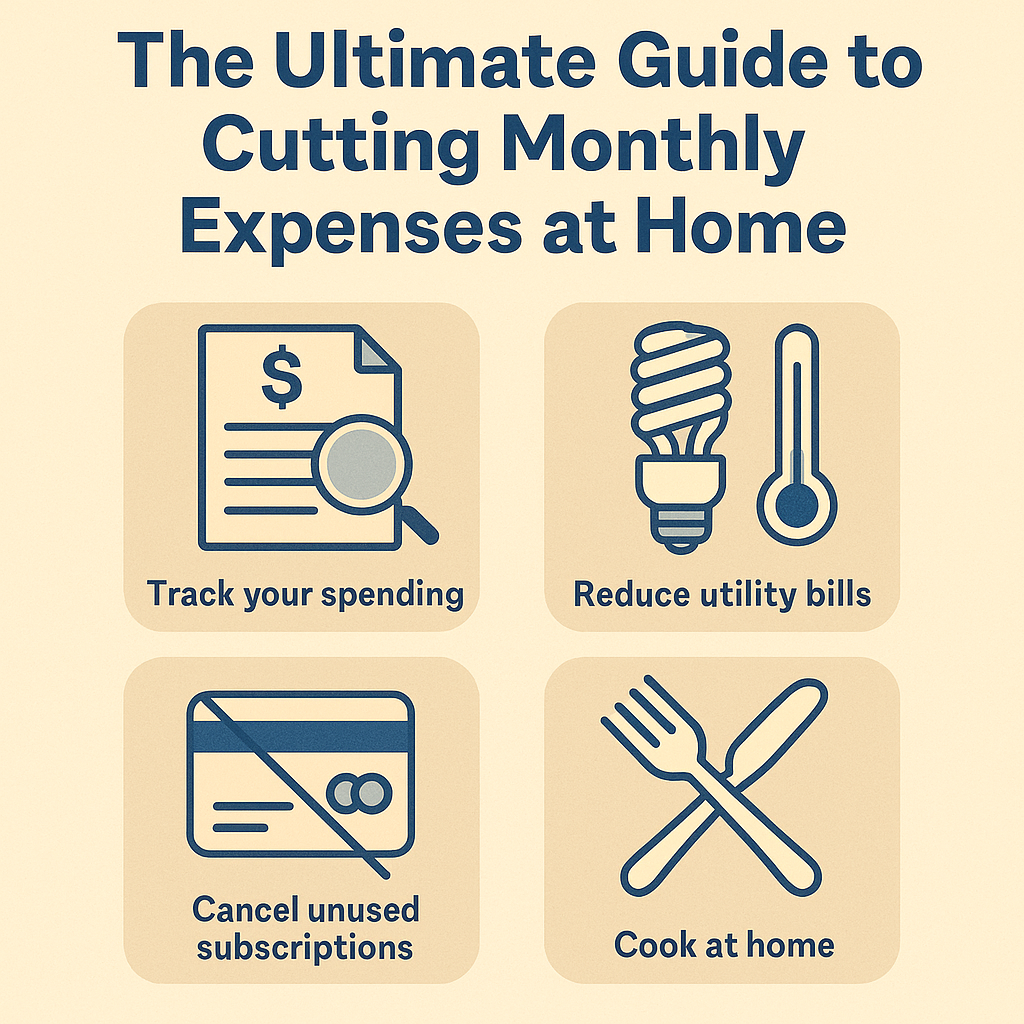Why Cutting Costs at Home Can Change Everything
Your home is your biggest financial ecosystem. It’s where the majority of your recurring expenses live — housing, utilities, food, entertainment, and more. By making small, strategic changes at home, you can significantly reduce your monthly costs without sacrificing comfort or lifestyle.
Cutting expenses doesn’t have to mean extreme measures. It’s about becoming more intentional, eliminating waste, and optimizing what you already use.
Here’s your ultimate guide to trimming home expenses and keeping more of your money.
Start With a Budget Audit
Before you cut anything, you need to know where your money is going.
Track all your home-related expenses:
- Rent or mortgage
- Electricity, water, gas
- Internet and phone
- Groceries
- Streaming services
- Subscriptions
- Home maintenance
- Insurance
Look at the last 2–3 months of bank statements and categorize everything. This will show you exactly what can be optimized.
Lower Your Utility Bills
Utilities can eat up a large portion of your budget, but there are ways to reduce them.
Electricity:
- Switch to LED bulbs
- Unplug appliances when not in use
- Use a smart thermostat
- Limit space heater and AC use
Water:
- Fix leaks and drips
- Install low-flow showerheads and faucets
- Run full loads in the dishwasher and washing machine
Gas/Heating:
- Seal windows and doors
- Lower your thermostat by a few degrees
- Dress in layers inside during colder months
These changes might seem small, but over time, they add up.
Review and Cancel Unused Subscriptions
Subscriptions are easy to forget — and they quietly drain your budget.
Review services like:
- Netflix, Hulu, Disney+
- Spotify, Audible
- Cloud storage you don’t use
- Apps with auto-renewal
Ask yourself: Do I use this every week? Can I live without it for a few months?
Even canceling just $20/month in unused services can save you $240 a year.
Reevaluate Your Internet and Phone Plans
Many people overpay for speed or features they don’t use.
Call your provider to:
- Ask for a lower rate or promotion
- Downgrade to a more appropriate plan
- Bundle services for discounts
Or, shop around — loyalty doesn’t always pay when it comes to utilities.
Cook at Home More Often
Food delivery and eating out can easily become one of your biggest home expenses.
Try these instead:
- Create a simple meal plan for the week
- Batch cook meals for easy reheating
- Use a slow cooker for cheap, flavorful meals
- Make snacks and drinks at home (like iced coffee)
Aim to reduce takeout by just 1–2 meals per week and you could save hundreds.
Be Smart With Groceries
Groceries are essential — but smart habits can stretch your dollar further.
Tips to save:
- Use a shopping list and stick to it
- Buy in bulk when it makes sense
- Choose generic brands
- Shop weekly, not daily
- Avoid pre-cut or packaged items
Apps like Flipp and grocery store apps often highlight deals you can plan around.
Shop Secondhand for Home Needs
Before buying something new for the house — furniture, kitchenware, decor — check secondhand options:
- Facebook Marketplace
- Local thrift stores
- Online classifieds
You’ll often find gently used items for 50–80% off retail price. This works especially well for kids’ items, which they outgrow fast.
Make DIY Repairs and Maintenance
Paying for home repairs is often necessary — but not always.
Learn simple maintenance skills:
- Change air filters
- Patch small holes in walls
- Re-caulk sinks or tubs
- Fix a leaky faucet
YouTube is full of tutorials that can save you hundreds in service calls. Just be sure to stay within your skill level.
Use Less and Waste Less
Be mindful of your household consumption.
- Turn off lights when leaving a room
- Use cold water for laundry
- Eat leftovers instead of tossing food
- Buy multi-use cleaning products
Wasting less means buying less — and buying less means spending less.
Negotiate Insurance and Bills
You can often save money on home-related insurance and bills simply by asking.
- Shop for better rates on home or renters insurance annually
- Ask your providers about loyalty or autopay discounts
- Bundle car and home insurance if applicable
It takes a few calls, but the savings can be significant — especially over a year.
Declutter to Avoid Buying Duplicates
Sometimes you buy things because you forgot you already had them. Cleaning and organizing your space helps you see what you own — and reduces the urge to buy more.
Decluttering also frees up physical and mental space, making your home more peaceful and efficient.
Build Better Habits, Not Just Cuts
The most important part of reducing home expenses isn’t the individual tips — it’s the habits you form.
Build habits like:
- Checking bills monthly
- Keeping a spending log
- Waiting 24 hours before making purchases
- Asking, “Do I need this?” before buying
These small mindset shifts will have a long-term impact.
Living Well for Less
Cutting expenses at home doesn’t mean going without. It means spending with intention and focusing on what truly brings value.
By making smarter choices, building better habits, and getting creative, you can reduce your monthly costs significantly — and create space for what matters most.
